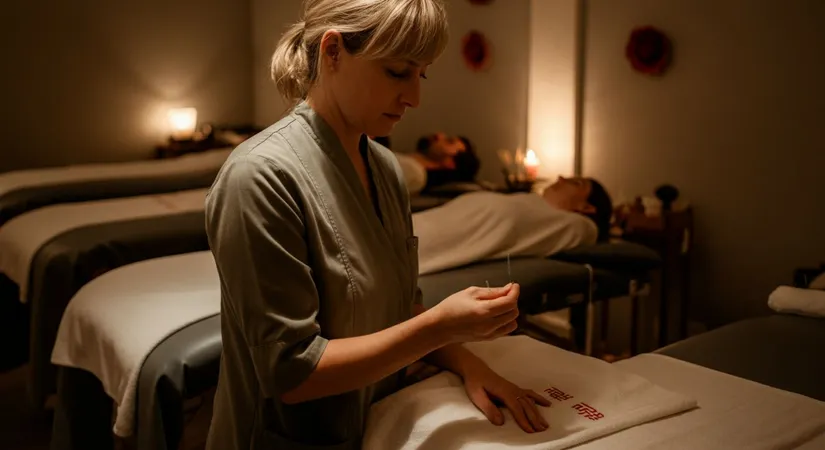Acupuncture London: Discover the Best Clinics and Effective Therapies
Dive into the world of acupuncture in London and explore holistic healing for mind and body.
Acupuncture, a cornerstone of Traditional Chinese Medicine (TCM) with a history spanning over 3,500 years, is increasingly popular globally, including in metropolitan areas like London. With many people seeking natural and holistic alternative therapies for pain relief and overall well-being, acupuncture remains a notable choice. This article explores its impact, especially in London's eclectic healthcare landscape.
Exploring the Best Acupuncture Clinics in London
Factors to Consider When Choosing an Acupuncture Clinic
When selecting an acupuncture clinic in London, it's essential to evaluate several critical factors. Expertise is paramount; practitioners should be well-trained in both traditional Chinese medicine and modern techniques. This dual expertise ensures comprehensive care tailored to individual needs.
Hygiene standards are another crucial consideration. Clinics must adhere to strict cleanliness protocols to prevent infections and ensure patient safety. A clean environment reflects the clinic's commitment to patient well-being and professionalism.
Patient feedback provides valuable insights into the clinic's reputation and service quality. Positive reviews often indicate a clinic's reliability and effectiveness in delivering acupuncture therapy. It's beneficial to explore both online reviews and personal recommendations.
Key Features of Top Acupuncture Clinics
- Integration of modern and traditional techniques for holistic health treatments.
- Personalized treatment plans addressing specific health concerns.
- Experienced practitioners with a deep understanding of acupuncture therapy.
Top clinics often integrate modern and traditional techniques, offering holistic health treatments that address a wide range of conditions. This approach enhances the effectiveness of acupuncture therapy, providing comprehensive care.
Personalized treatment plans are another hallmark of leading clinics. These plans are tailored to address specific health concerns, ensuring that each patient receives the most appropriate care for their condition.
Steps to Ensure a Safe Acupuncture Experience
- Research the clinic's credentials and practitioner qualifications.
- Verify the clinic's hygiene practices and safety protocols.
- Consult with the practitioner to discuss your health goals and concerns.
Ensuring a safe acupuncture experience involves several steps. First, research the clinic's credentials and the qualifications of its practitioners. This ensures that you are in capable hands.
Next, verify the clinic's hygiene practices and safety protocols. This step is crucial for preventing infections and ensuring a safe treatment environment.
Finally, consult with the practitioner to discuss your health goals and concerns. This dialogue helps tailor the treatment to your specific needs, enhancing the effectiveness of the therapy.

How Acupuncture Therapy Provides Pain Relief
Mechanisms Behind Acupuncture's Pain-Relieving Effects
Acupuncture therapy is renowned for its ability to alleviate pain by targeting specific body points. This ancient practice, rooted in traditional Chinese medicine, aims to balance the body's energy flow, known as Qi. Scientific studies have shown that acupuncture can effectively treat conditions such as migraines, arthritis, and back pain.
One mechanism through which acupuncture provides pain relief is by stimulating the nervous system. This stimulation releases neurotransmitters like endorphins, which are natural painkillers. For instance, patients with chronic back pain often experience significant relief after acupuncture sessions, as these neurotransmitters help reduce pain perception.
Another way acupuncture aids in pain relief is by improving blood circulation. Enhanced circulation can reduce inflammation and promote healing in affected areas. For example, individuals suffering from arthritis may find that acupuncture reduces joint inflammation, leading to decreased pain and improved mobility.
Unique Benefits of Acupuncture Therapy
- Non-invasive treatment option with minimal side effects.
- Personalized therapy tailored to individual pain conditions.
- Complementary to other holistic health treatments.
Acupuncture therapy offers several unique benefits. It is a non-invasive treatment option with minimal side effects, making it an attractive choice for those seeking alternatives to medication. Additionally, acupuncture sessions are personalized, addressing each individual's specific pain conditions, which enhances treatment effectiveness.
Moreover, acupuncture can be integrated with other holistic health treatments, providing a comprehensive approach to pain management. This integration allows patients to benefit from a broader spectrum of therapeutic techniques, promoting overall well-being.
Steps to Experience Effective Pain Relief with Acupuncture
- Consult with a qualified acupuncture therapist to assess your pain condition.
- Develop a personalized treatment plan tailored to your specific needs.
- Regularly attend acupuncture sessions and monitor progress.
To experience effective pain relief through acupuncture, it's essential to consult with a qualified therapist who can assess your specific pain condition. This initial consultation helps in developing a personalized treatment plan that addresses your unique needs.
Regular attendance at acupuncture sessions is crucial for monitoring progress and making necessary adjustments to the treatment plan. This ongoing evaluation ensures that the therapy remains effective and continues to provide pain relief.

Understanding Traditional Chinese Medicine and Its Benefits
Core Principles of Traditional Chinese Medicine
Traditional Chinese Medicine (TCM) is a holistic approach that emphasizes the balance of energy, or Qi, within the body. This ancient practice integrates various modalities, including acupuncture, herbal remedies, and lifestyle adjustments, to promote overall well-being.
One core principle of TCM is the concept of Yin and Yang, representing the dual forces that must be balanced for optimal health. For example, an imbalance might manifest as physical symptoms, which TCM aims to correct through tailored treatments.
Another fundamental aspect is the Five Elements theory, which associates different body systems with elements like wood, fire, and water. This theory helps practitioners diagnose and treat conditions by understanding the interactions between these elements.
Benefits of Acupuncture in TCM
- Enhances energy flow, promoting physical and mental balance.
- Supports the body's natural healing processes.
- Reduces stress and improves emotional well-being.
Acupuncture, a key component of TCM, offers numerous benefits by enhancing the body's energy flow. This practice not only promotes physical balance but also supports mental health, making it a comprehensive treatment option.
Additionally, acupuncture aids in the body's natural healing processes. For instance, it can accelerate recovery from injuries by improving circulation and reducing inflammation.
Moreover, acupuncture is known for its ability to reduce stress and improve emotional well-being. By targeting specific points, it helps release tension and fosters a sense of calm, contributing to overall health.
Steps to Integrate TCM into Your Lifestyle
- Consult with a certified TCM practitioner to assess your health needs.
- Incorporate recommended herbal remedies and dietary changes.
- Regularly practice acupuncture and other TCM therapies.
Integrating TCM into your lifestyle begins with consulting a certified practitioner who can assess your health needs and recommend appropriate treatments. This personalized approach ensures that the therapies align with your specific conditions.
Incorporating herbal remedies and dietary changes is another crucial step. These adjustments can enhance the effectiveness of TCM treatments and support long-term health improvements.
Finally, regularly practicing acupuncture and other TCM therapies helps maintain balance and prevent health issues. Consistent application of these practices fosters a holistic approach to well-being, addressing both physical and emotional aspects.
Is Acupuncture Safe? What You Need to Know
Ensuring Safety in Acupuncture Practices
Acupuncture, a key component of traditional Chinese medicine, is widely regarded as safe when performed by trained and licensed practitioners. The procedure involves inserting thin needles into specific points on the body to balance energy flow and promote healing.
To ensure safety, practitioners must adhere to strict sterility protocols. This includes using disposable needles and maintaining a clean environment to prevent infections. For example, clinics in London often follow rigorous hygiene standards to protect patients.
Precision in technique is also crucial. Practitioners must have a deep understanding of anatomy to avoid complications. This expertise is typically gained through extensive training and certification processes, ensuring that practitioners can safely administer treatments.
Selecting the Right Practitioner
- Verify the practitioner's credentials and licensing.
- Check for membership in professional acupuncture associations.
- Seek recommendations from trusted sources or online reviews.
Choosing the right practitioner is vital for a safe acupuncture experience. Patients should verify the practitioner's credentials and ensure they are licensed to practice. Membership in professional associations, such as the British Acupuncture Council, can also indicate a practitioner's commitment to high standards.
Additionally, seeking recommendations from trusted sources or reading online reviews can provide insights into a practitioner's reputation and the quality of their services. This research helps patients make informed decisions and select practitioners who prioritize safety and effectiveness.
Steps to Prepare for a Safe Acupuncture Session
- Discuss your medical history and current health conditions with the practitioner.
- Understand the procedure and what to expect during the session.
- Follow any pre-session guidelines provided by the practitioner.
Preparing for an acupuncture session involves several important steps. First, patients should discuss their medical history and current health conditions with the practitioner. This information helps tailor the treatment to individual needs and ensures safety.
Understanding the procedure and what to expect during the session can alleviate anxiety and enhance the overall experience. Practitioners typically explain the process and address any concerns before beginning the treatment.
Finally, following any pre-session guidelines provided by the practitioner is crucial. These guidelines may include dietary recommendations or advice on clothing, ensuring that the session proceeds smoothly and safely.
Integrative Acupuncture Techniques for Holistic Health
Ensuring Safety and Efficacy in Acupuncture Practices
Frequently Asked Questions
What are the key factors to consider when choosing an acupuncture clinic in London?
How does acupuncture therapy provide pain relief?
Is acupuncture safe, and what precautions should be taken?
What are the benefits of integrating Traditional Chinese Medicine into your lifestyle?
How can I ensure a safe and effective acupuncture experience?
Discover the Path to 'Healthy Beauty' with estethica! Contact us today for a free consultation and experience the excellence in aesthetic and wellness services.
📞 Call Now for Your Free Consultation